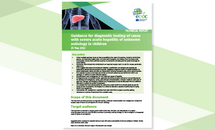Guidance for diagnostic testing of cases with severe acute hepatitis of unknown aetiology in children
This document provides guidance on diagnostic testing, molecular characterisation and metagenomic analysis for suspect cases of severe acute hepatitis of unknown aetiology.
Executive Summary
Key points
- Collect multiple specimen types as close as possible to the onset of symptoms, including whole blood, plasma, oro-/naso-pharyngeal, stool, and urine (and if possible, liver biopsy) from the cases under investigation. Ensure that a sufficient quantity is collected for all testing and for potential storage for future testing.
- Preliminary data indicate that whole blood is an important sample matrix to test for viruses, particularly adenovirus.
- ECDC suggests that sequential sampling for detection, quantification and metagenomic purposes are performed at defined and documented timepoints. Suggested timepoints include at hospital admission, by patient deterioration, before and after any interventions, including therapeutic ones, and by patient recovery.
- It is important to ensure that tests are carried out for both adenovirus and SARS-CoV-2 (PCR and serology), in addition to other infectious agents.
- Simultaneously start investigations for non-infectious causes of hepatitis.
- If diagnostics are not available locally, specimens should be promptly referred to national laboratories for aetiological investigations, typing, and pathogen characterisation. Transport media for each type of specimen, storage, and shipping conditions (e.g. temperature) should be discussed with the reference laboratory to assure the quality of specimens.
- Any samples that have tested positive for adenovirus and/or SARS-CoV-2 should ideally be sent for typing as soon as possible or be shipped to a reference laboratory capable of performing the typing and/or virus sequencing.
- Laboratories with metagenomic capacities have been identified to support countries seeking metagenomic analysis of specimens from probable cases.
Download

Guidance for diagnostic testing of hepatitis
- EN - [PDF-308.29 KB]






